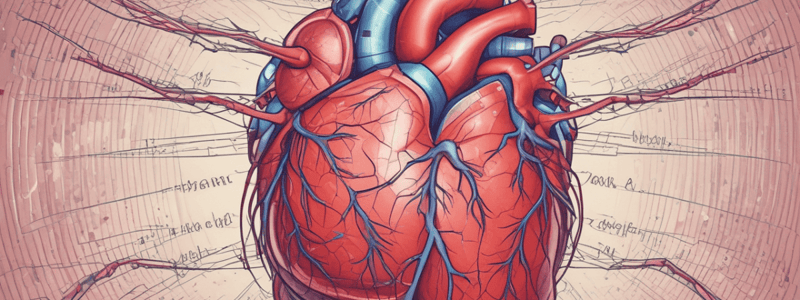Podcast
Questions and Answers
What is the primary cause of Stable Angina?
What is the primary cause of Stable Angina?
- Acute onset of chest pain unrelieved by rest
- Narrowing of coronary artery by stable, slowly growing atherosclerotic plaque (correct)
- Myocardial oxygen deprivation leading to anerobic metabolism
- Rupture of atherosclerotic plaque with thrombosis
Which type of ischemia occurs in Unstable Angina?
Which type of ischemia occurs in Unstable Angina?
- Reversible ischemia
- Subendocardial ischemia
- Supply ischemia (correct)
- Demand ischemia
What is the result of myocardial oxygen deprivation in the mechanism of action of heart disease?
What is the result of myocardial oxygen deprivation in the mechanism of action of heart disease?
- Phagocytosis of necrotic cells
- Switching to anerobic metabolism
- Lactate accumulation leading to damaged cell membrane (correct)
- Necrosis of cells leading to replacement with collagen fibers
What is the characteristic ECG finding during a Stress Test in Stable Angina?
What is the characteristic ECG finding during a Stress Test in Stable Angina?
What is the primary difference between Non-ST elevation MI and ST elevation MI?
What is the primary difference between Non-ST elevation MI and ST elevation MI?
What is the characteristic ECG finding in Non-ST elevation MI?
What is the characteristic ECG finding in Non-ST elevation MI?
What is the outcome of necrotic cells in the mechanism of action of heart disease?
What is the outcome of necrotic cells in the mechanism of action of heart disease?
What is the characteristic of chest pain in Unstable Angina?
What is the characteristic of chest pain in Unstable Angina?
Flashcards are hidden until you start studying
Study Notes
Types of Angina and Myocardial Infarction
Stable Angina
- Caused by narrowing of coronary artery by stable, slowly growing atherosclerotic plaque, leading to demand ischemia
- Presentation: chest pain, pressure, tightness with activity, relieved with rest
- Diagnostic tests: ST depression during stress test, normal ECG during rest, negative troponins
- Mechanism: reversible ischemia in subendocardial area
Unstable Angina
- Caused by acute onset of rupture of atherosclerotic plaque with thrombosis, leading to supply ischemia and subendocardial ischemia
- Presentation: acute onset of chest pain, pressure, tightness at rest or unrelieved by rest
- Diagnostic tests: ST depression during rest, negative troponins
- Mechanism: reversible ischemia in subendocardial area
Non-ST Elevation Myocardial Infarction (NSTEMI)
- Caused by acute onset of rupture of atherosclerotic plaque with nearly 100% thrombosis
- Presentation: acute onset of chest pain, pressure, tightness at rest or unrelieved by rest
- Diagnostic tests: ST depression, positive troponins
- Mechanism: infarction that is irreversible
ST Elevation Myocardial Infarction (STEMI)
- Caused by acute onset of rupture of atherosclerotic plaque with nearly 100% thrombosis
- Presentation: acute onset of chest pain, pressure, tightness at rest or unrelieved by rest
- Diagnostic tests: ST elevation, positive troponins
- Mechanism: infarction that is irreversible
Studying That Suits You
Use AI to generate personalized quizzes and flashcards to suit your learning preferences.



